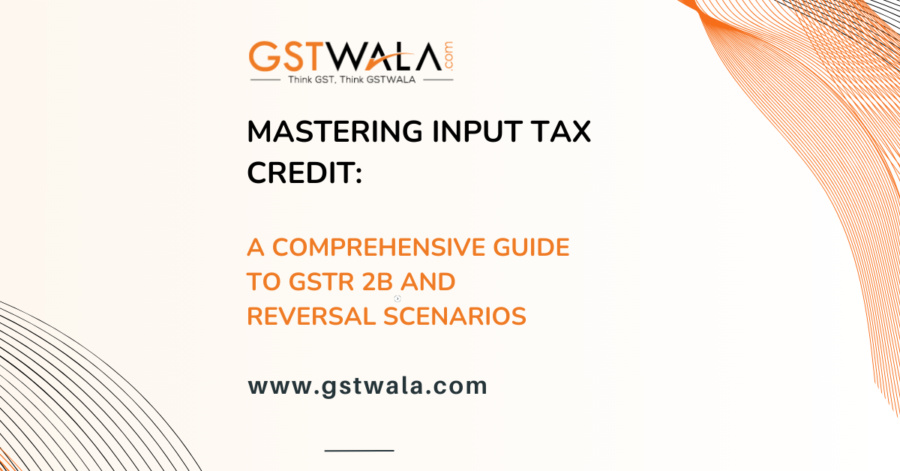
Mastering Input Tax Credit: A Comprehensive Guide to GSTR 2B and Reversal Scenarios
Since the inception of Goods and Services Tax (GST), the aim has been to create a progressive tax system. In this article, we delve into the intricacies of GST Input Tax Credit (ITC), focusing particularly on GSTR 2B and the circumstances under which reversal of ITC arises. Understanding these aspects is crucial for businesses to optimize their tax credits and ensure compliance with GST regulations.
Unlocking GSTR 2B: A Key to Claiming ITC: GSTR 2B, an auto-drafted statement for regular taxpayers, plays a pivotal role in claiming ITC under GST. It serves as a comprehensive guide, generated monthly based on supplier details provided in GSTR-1, GSTR-5, or GSTR-6. Unlike GSTR-2A, GSTR 2B is a read-only statement, ensuring accuracy and reliability. Taxpayers must rely on GSTR 2B to claim eligible ITC, as it reflects the most up-to-date information on input tax credits available.
Understanding GSTR 2B in Detail: GSTR 2B serves as an invaluable tool for taxpayers, offering insights into their eligible ITC for the month. It is generated after the 12th day of each month, providing a comprehensive overview of input tax credits available for claim. Taxpayers must ensure that their suppliers file their returns accurately and on time to reflect the correct ITC in GSTR 2B. This auto-generated statement is available in Excel and JSON formats, facilitating easy access and analysis for taxpayers.
Navigating the Complexities of Input Tax Credit: To claim input tax credit successfully, taxpayers must adhere to certain prerequisites and guidelines. These include:
Being registered under GST law.
Receipt of tax invoice or debit note from the registered supplier.
Utilization of goods or services received for business purposes.
Compliance with return filing and tax payment by the supplier.
Timely claiming of ITC within the prescribed time limit.
Special Circumstances and Ineligible ITC: Section 18 of the CGST Act outlines special circumstances under which input tax credit may be claimed. Additionally, certain items and scenarios render ITC ineligible, including purchases for personal use, expenses on exempted supplies, and transactions involving specific goods or services. Taxpayers must exercise caution to avoid claiming ineligible ITC, as it may lead to penalties and liabilities.
Reversal of Input Tax Credit: Reversal of ITC may occur under various circumstances, such as:
Failure to pay the supplier within 180 days.
Utilization of inputs for personal or exempted purposes.
Sale of capital goods on which ITC was claimed.
Issuance of credit notes by the supplier.
Transition from regular dealer to composition scheme, among others.
Navigating Rule 37A and Reclaiming Reversed ITC: Rule 37A of the CGST rules applies when suppliers fail to file GSTR-3B, necessitating the reversal of claimed ITC by recipients. However, recipients can reclaim reversed ITC once the supplier files GSTR-3B and pays the due taxes. Timely compliance with reversal rules is essential to avoid interest and maintain regulatory adherence.
Rules for Reversal of ITC: The text explains the rules for reversal of ITC under Rule 42, 43, and 44, which include specific provisions for inputs, input services, and capital goods. It highlights the need for distinguishing ITC amounts attributable to taxable and non-taxable supplies or personal consumption.
Levy of Interest on Reversal of ITC: The text discusses legal principles regarding the levy of interest on the reversal of wrongly availed ITC. It cites court cases and emphasizes that interest should be compensatory in nature and should only be levied when there is a loss to the revenue.
Case Laws on ITC: Various court judgments are cited to illustrate the interpretation of ITC provisions, including the strict interpretation of Section 16(2)(c) of the CGST Act, the responsibility of buyers in verifying supplier compliance, and the priority of recovery actions against defaulting suppliers.
Steps to Prevent Fake Invoicing: The text outlines steps that authorities can take to prevent entities from engaging in fraudulent activities such as fake invoicing. These include creating an offense database, canceling GST registration of fraudulent entities, recovery actions, and invoking relevant provisions of the law.
Court Judgments on ITC: The text summarizes court judgments related to ITC, such as the entitlement of buyers to claim ITC even if the supplier’s registration is retrospectively canceled, the importance of considering buyer documents in ITC claims, and the invalidity of circulars conflicting with statutory provisions.
Overall, the text provides a comprehensive overview of the regulatory framework, legal principles, and judicial interpretations related to Input Tax Credit under the GST regime.
Stay ahead of the curve with gstwala.com; Together, let’s simplify GST for a smoother business journey. We are just a click away info@gstwala.com
